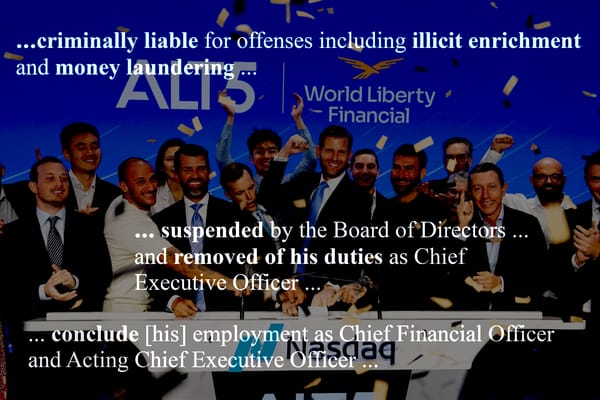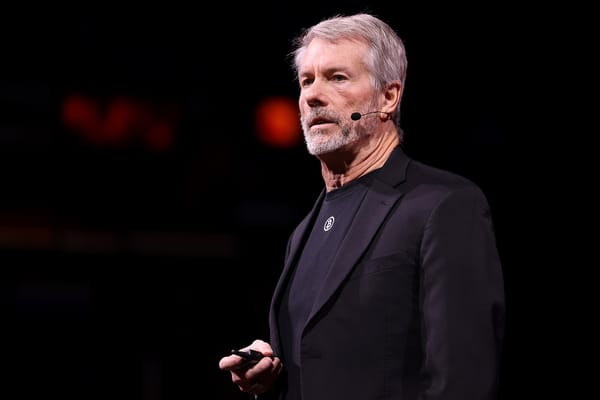Fighting for our web
A talk from XOXO
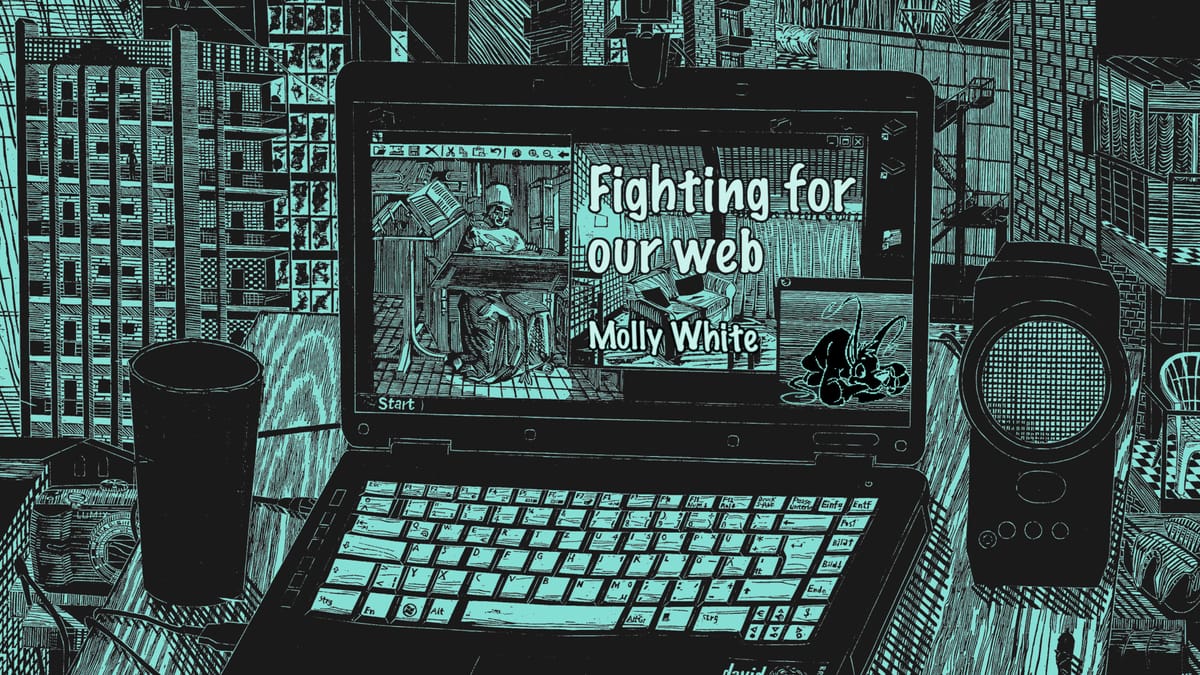
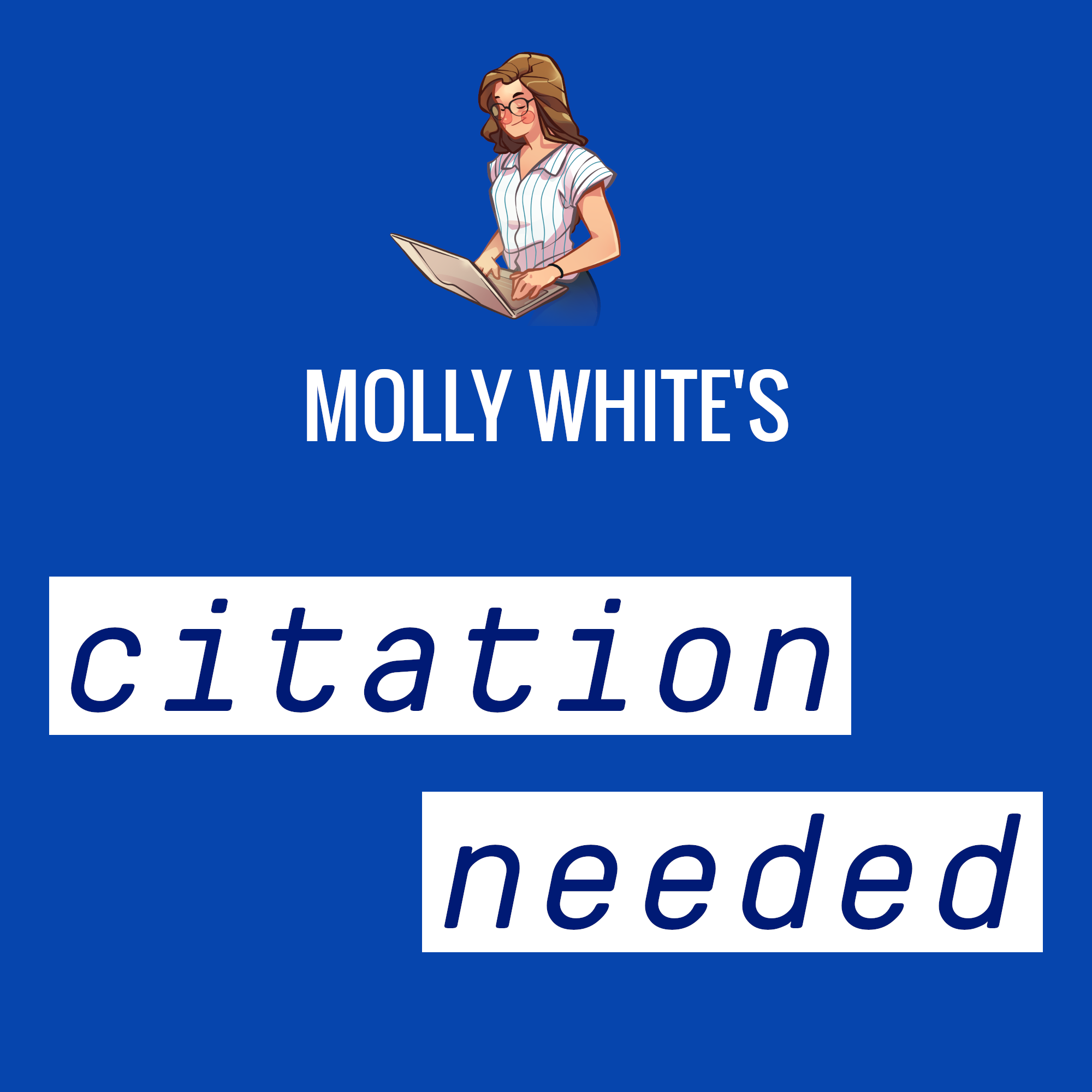
Earlier this year, I gave a talk about the very important fight for our web, and how we can all play a part in it. The recording is now up on YouTube, or scroll down to read a transcript.
Recordings of all the other talks from XOXO will be going up on their YouTube channel over the course of this week, and I strongly recommend watching every single one of them.
Good morning. How is everyone? It's so great to be here. XOXO has been amazing. Some people I've talked to are surprised to find this is my first XOXO, despite the fact that I should have been here years ago and somehow wasn't. But I'm very happy to be here before it's all over. So extremely happy.
Some of you probably know me for my Web3 is Going Just Great project, which I started a couple of years ago, and you might be thinking I’m here to talk about crypto. Don’t worry.
I’m here to launch my crypto token, actually! MollyCoin will be launching this afternoon. You can get in on the ground floor. Very exciting.
No. I’m actually here to talk about some of the good things on the web because I spend a lot of my time talking about all of the bad things.
I just wanted to ask: Do you remember the first time you felt like the web was magic? A lot of us, it’s probably been decades, right, that you've been on the web, so it might be hard to think of that very first moment, but there’s probably something that sticks out in your head. Take a second and just try to think about it.
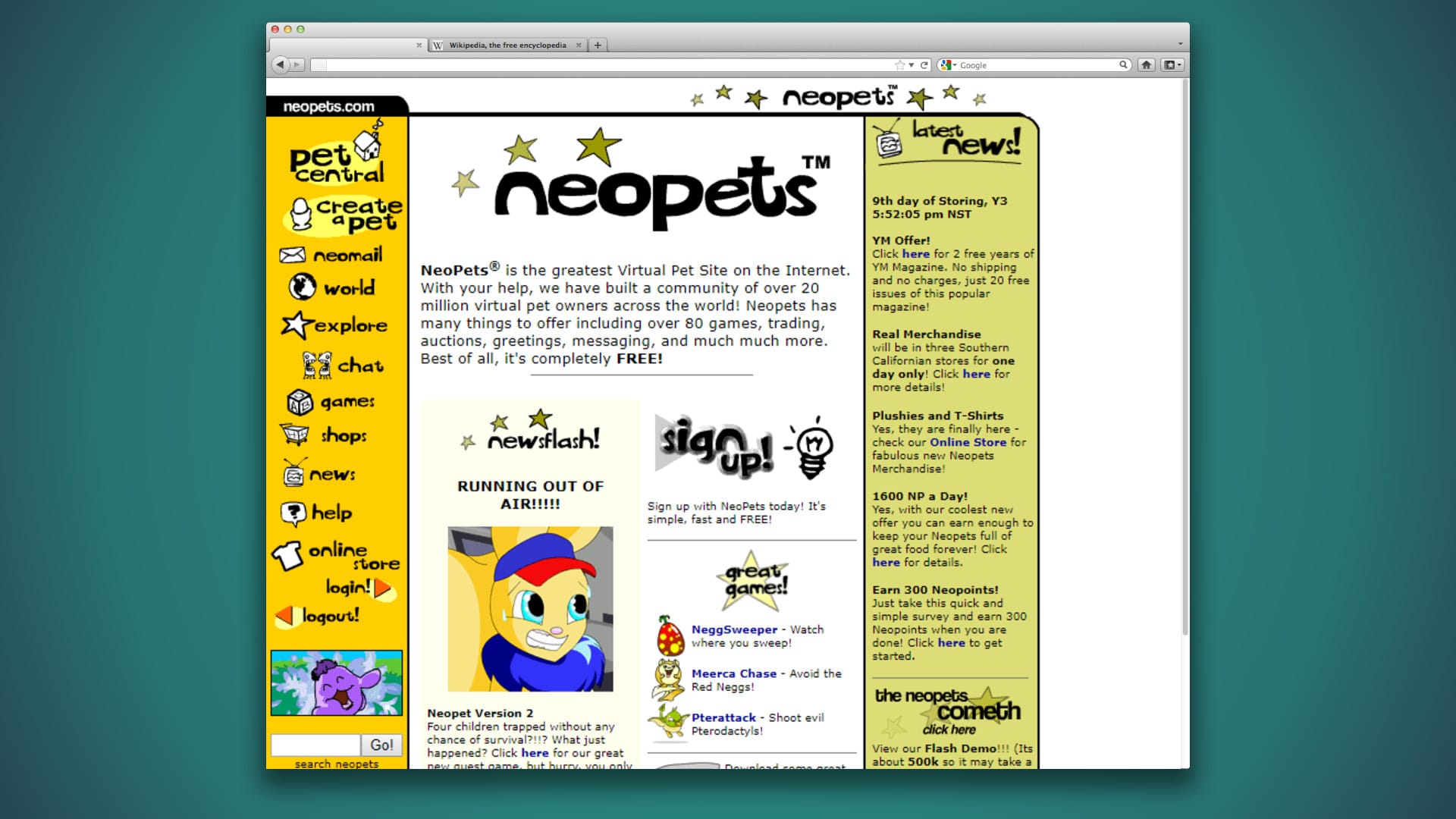
For me, it was Neopets. How many of you played Neopets? Any Neopets people here? Awesome. So, I know it still exists—you can still go to Neopets.com today. I’m so afraid to ruin the nostalgia that I have not looked at what it is today. Hearing they were exploring NFTs a couple of years ago almost killed me.
But from what I remember of it, and bear with me because I was probably ten years old at the time, you would adopt these little cartoon pets, and you could feed them, and play with them, and buy things for them. And I honestly actually don’t remember that much about the gameplay aside from the fact that I think you could paint them different colors, and you fed them omelets for some reason.
Anyway, what I do really remember about Neopets was that every player got a profile page that was called a "user lookup."
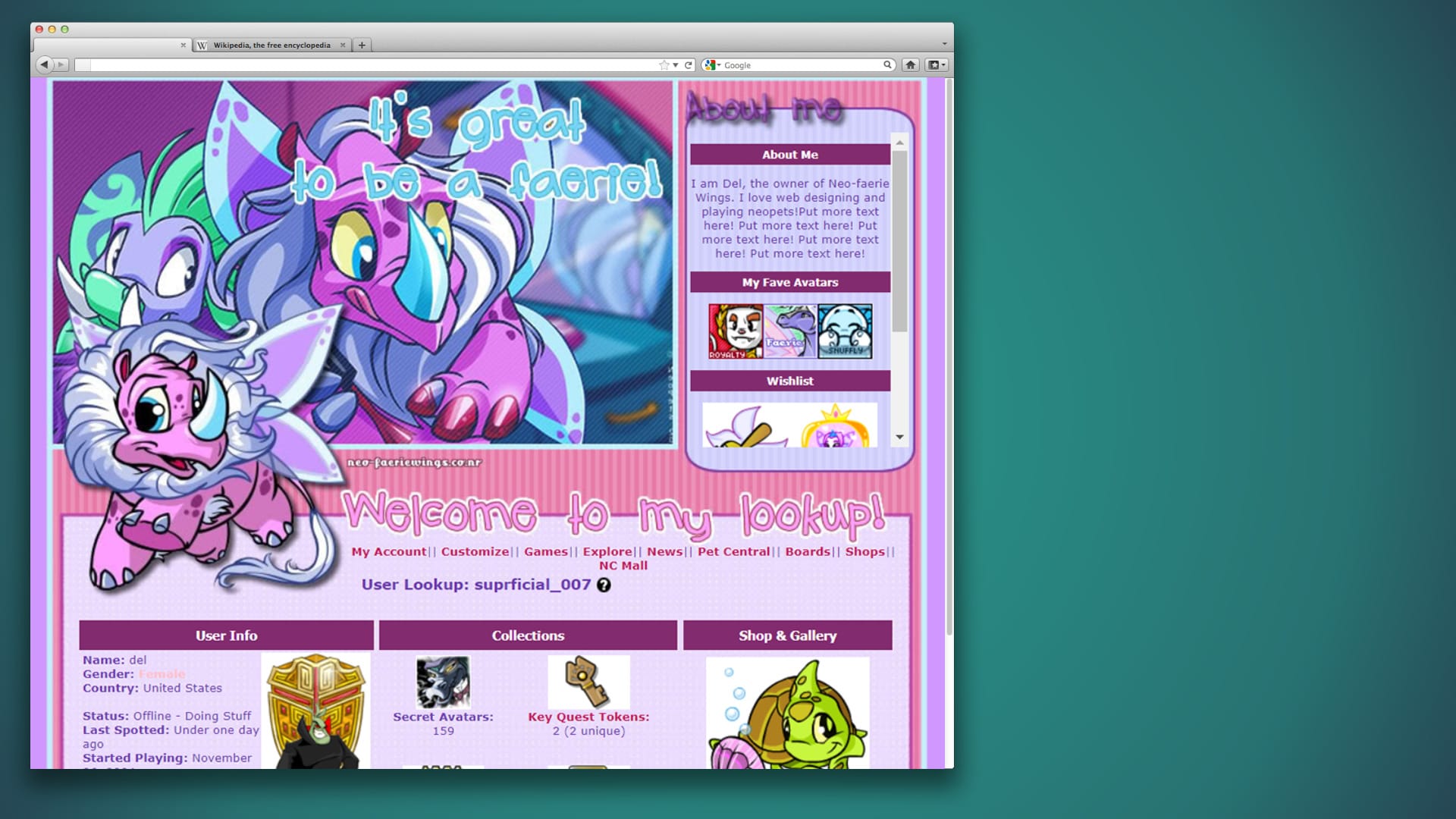
The site let you customize the HTML and CSS for the page, and this opened the doors to what was just absolute beautiful chaos. Think glitter GIFs and marquee tags and autoplaying MIDI songs of, like, Smash Mouth songs. Yeah. And don’t yell at me, but HTML tables used for layouts because we were like a decade away from flexbox at the time.
Anyone who wasn’t on Neopets at the time but was using MySpace can probably still imagine roughly what I’m talking about. Just think more cartoon fairies and less My Chemical Romance.
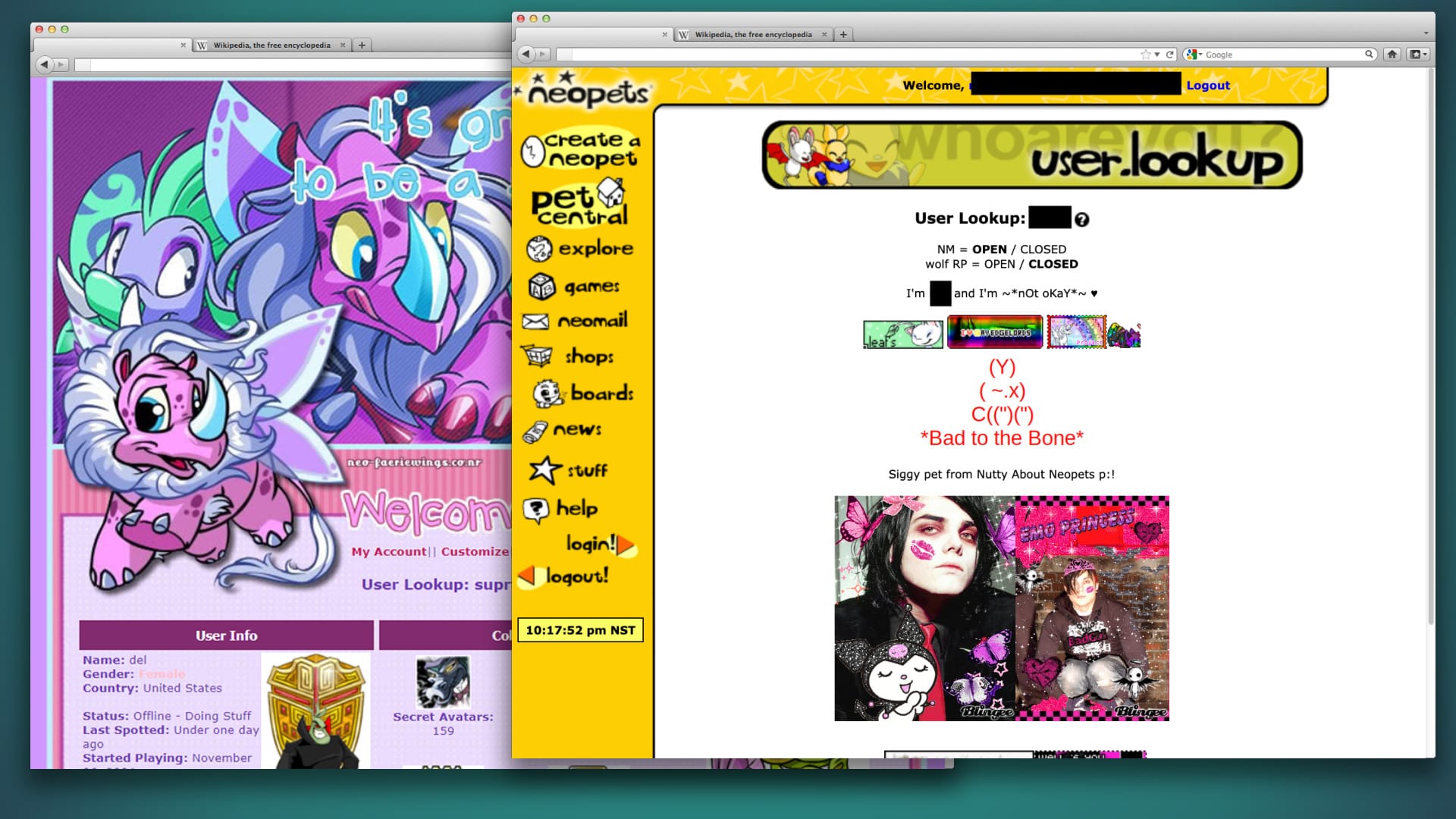
But maybe not that much less My Chemical Romance.
As far as I can remember, Neopets user lookups were the moment that the internet changed in my head from something with pages I could read and maybe games that I could play to something that I could change. What was once just a book on the shelf was now a canvas where I could create and write and remix.
I had already been drawn to computers even back when I thought it was sort of just a one-way street. I didn’t even realize how long I’ve loved computers until I unearthed this book that I made when I was five years old.
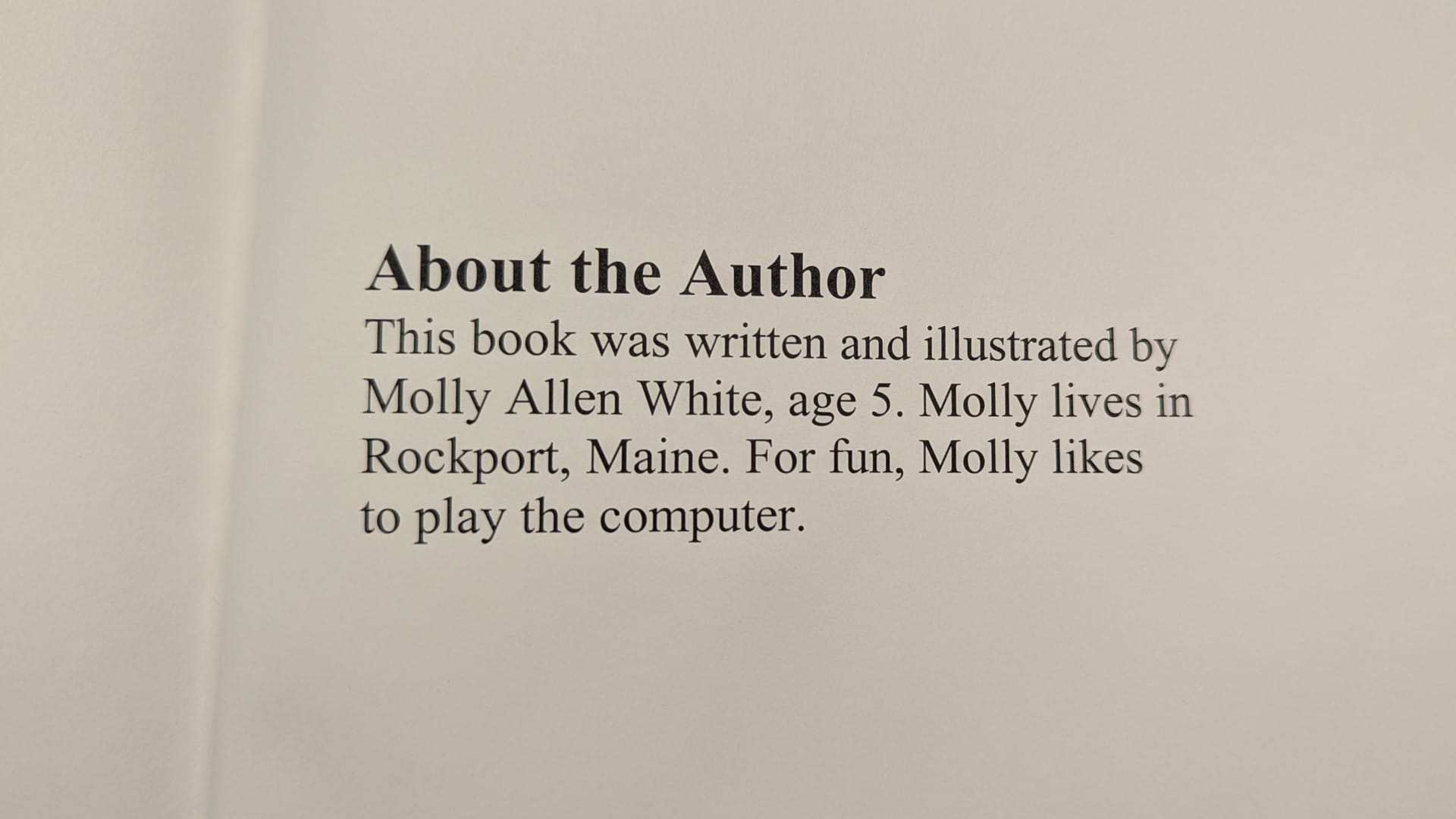
It was from, like, a little kit that you could send off and they would print out a book for you, and it was about my life, but I included in the "about the author" section that “for fun, Molly likes to play the computer.”
My new discovery that I could edit the internet made me obsessed. I have a brother about my age, and we would fight terribly over our allotted time on the home computer. Him to play Age of Empires II, and me so I could painstakingly edit my user lookup backgrounds pixel by pixel in MS Paint and learn what CSS I needed to turn a visitor’s cursor into a shooting star. My mom put an egg timer on the desk to try to make it so that we could handle our 30-minute turns without her having to referee, but soon we were both trying to turn the timer back without the other person hearing the ticking change. Yeah, brutal fights.
Neopets was the first such discovery for me, but it was far from the last. Soon after, I would discover free web hosting services like GeoCities, where I was allowed to do a lot more than was allowed in the Neopets sandboxed page editor. Then I discovered that I could edit Wikipedia. Twelve years old, I saw “the encyclopedia that anyone could edit”, and I was like, "I’m anyone!" They frowned upon the sort of HTML art projects that Neopets and GeoCities invited, but it was a place where I could contribute to and be a part of something that was much bigger than a page that had a hit counter that numbered in the tens.
Later on, I would discover Python and JavaScript, and it was like being an artist with access to every art supply you could ever want. Every time I would discover something like this, I would get this same feeling—a burning feeling of excitement that I could feel right here. Does anyone else get that feeling, or is that just me, like right here? Yeah.
It was that feeling that would keep me up until four in the morning, or have me rushing through my schoolwork—or later, my actual work—so that I could go back to the things that I actually really wanted to be doing. Twelve hours would pass in a second as I built a website or wrote a Wikipedia article or coded up a silly Twitter bot to entertain me and my friends at a college hackathon. Sometimes I would get so engrossed that I had to remind myself to eat, or I’d get crabby if something in real life dragged me away from my projects.
Even if it doesn’t feel exactly the same for you, I imagine a lot of the types of people at this conference have had a feeling sort of like this. But for those who have—has it been a while?
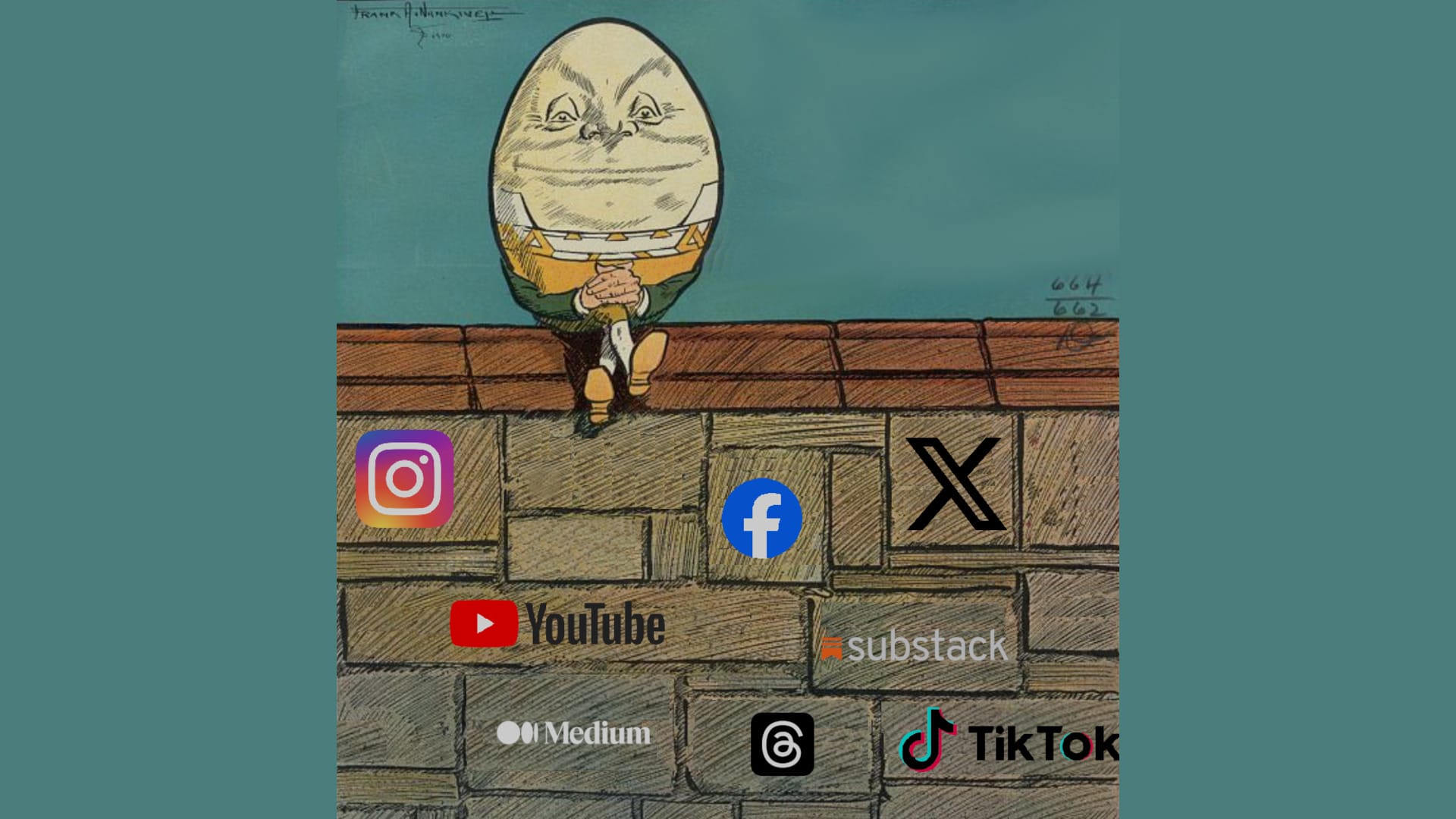
For a lot of people, the web feels worse than it used to. Much of our time is spent on a handful of giant social networks that do everything they can to keep people in their apps for as long as possible, even if it has detrimental effects on the people who are using them, or on the social networks themselves. Engagement farming and rage-baiting are rewarded, misinformation and disinformation proliferate, and the temperature often feels like it’s been turned way up in any interaction where people are just waiting to interpret the things that you say as uncharitably as possible.
Platforms we used to love have turned into shambling zombies as those who run them make clear that the wants of their users are little more than irritating requests to be ignored in search of ever more revenue. Websites outside of these handful of social networks are harder and harder to even find, and partially because of that, they have a harder and harder time sustaining themselves. What is out there is buried among ever-growing piles of useless content farm material or, increasingly, AI-generated garbage. And the scrapers run by the companies that help generate the AI garbage are pushing more and more high-quality work out of reach, with people either placing it behind paywalls or other such barriers, or choosing not to publish it at all because it means their hard work might be used to train these models without their consent.
We’re often being yanked around by tech companies that foist upon us what they think is going to be the next big thing. The blockchain. The auto-playing videos that are created by journalists whose bosses insist that "video is the future of news." To metaverse tools that promise to make our Zoom calls into low-poly, nausea-inducing experiences with our coworkers. To generative AI assistants that we have to babysit as they bungle whatever it was that we were trying to do, as they ship our private data off to probably low-security servers somewhere.
A lot of excitement around the early idealism of the web has broadly dwindled. There was naivety in that idealism, to be sure—that the web would solely be a force for good, something that would break down barriers, bring people together, and allow information to be free. But especially lately, it seems like the web has just become another tool of unfettered capitalism, as massive companies build ever higher walls around their internet empires, treating the people who use their software as resources from which to extract money and personal data.
What is left for those of us who saw the web as an infinite canvas, a tool to reach those who we never could have dreamed of reaching before, a medium that could stretch the limits of what was even possible in an analog world? Judging by mainstream talking points about big tech and the coinage of terms like "the techlash" to describe the much harsher opinion of tech companies compared to their earlier days, I think this is a fairly widespread feeling.
So, having said all this, would it surprise you to hear that now more than ever, I feel that same burning feeling of excitement around what’s possible?
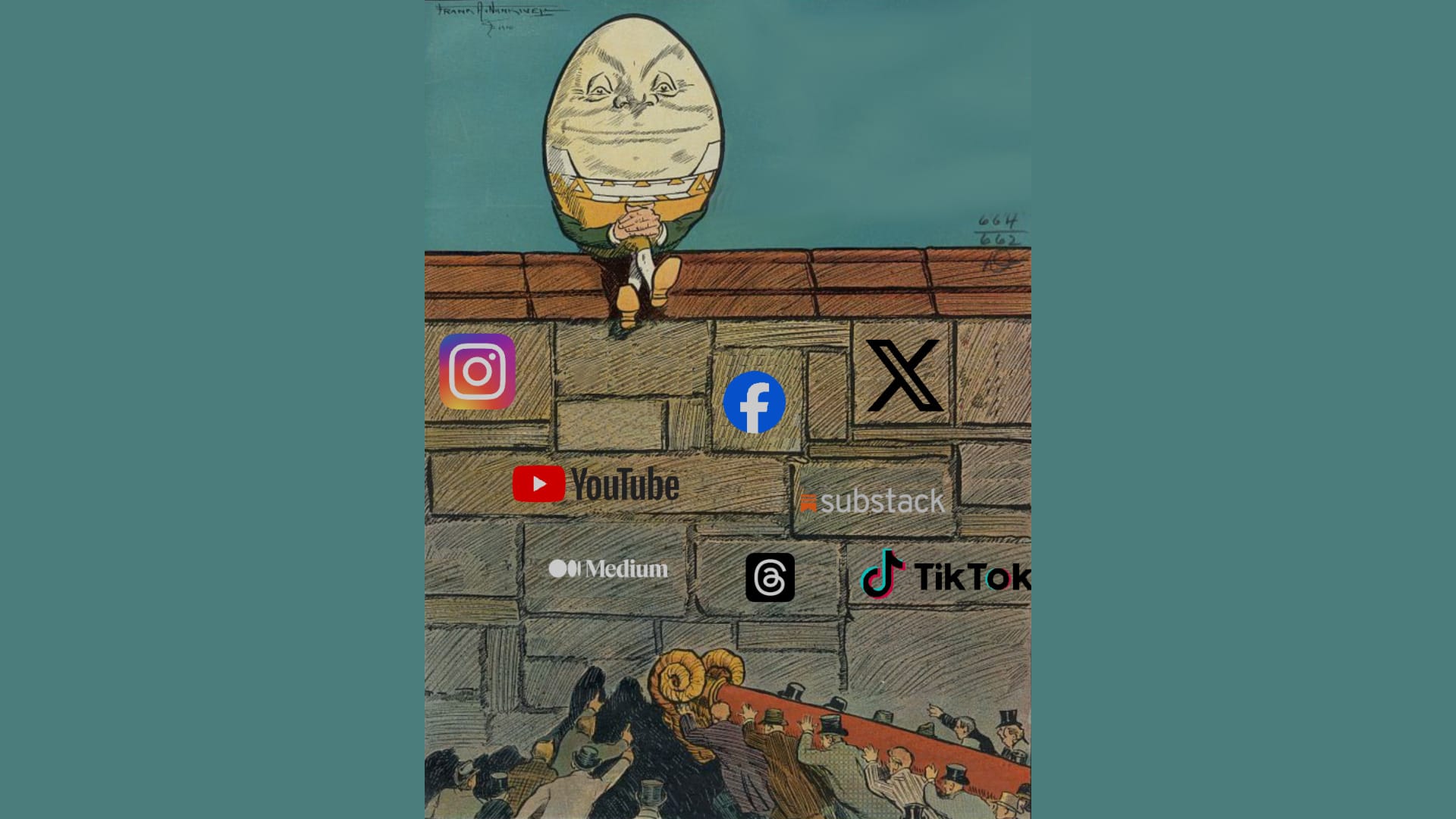
That’s because what really sucks about the web these days, what has us feeling despair and anger, has everything to do with the industry that has formed around the web, but not the web itself. The web is still just a substrate on which anything can be built. Most importantly, the web is the people who use it, not the companies that have established themselves around it.
And the widespread disillusionment that we’re seeing may actually be a good thing. More people than ever have realized that the utopian dreams of a web that could only bring about positive and wonderful things might have been misguided. That tech companies maybe don’t always have our best interests in mind. And that slogans like "don’t be evil" might be more about marketing than about truth.
With this knowledge comes power. The power to shape the web that we want to see, while fighting against the one that we don’t. The tech industry has structural and financial power of its own, to be sure, but the only thing that enables the kind of rot—and to quote the great Cory Doctorow, “enshittification”—that we’ve seen spread throughout the platforms that now form a large part of people’s online experiences, is the platforms’ stranglehold on the web. And that is tenuous.
My experience in fighting this fight has helped to convince me of just how much power we, everyday normal people, have—even when we’re staring down massive platforms and billion-dollar companies.
I run a website called Web3 is Going Just Great. I created it in late 2021.
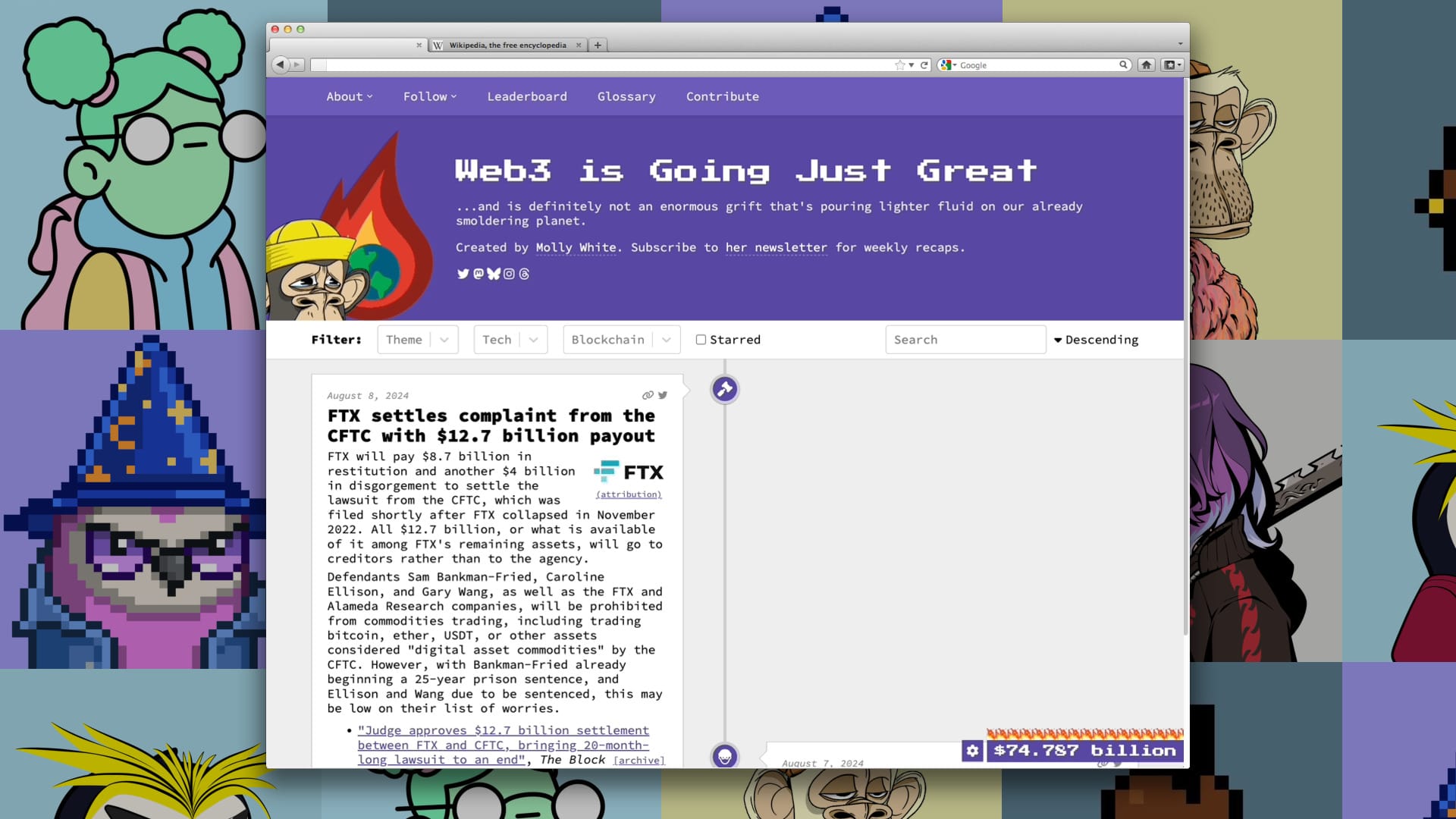
Now for those of you who were there in late 2021, the tech industry was doing what it does best—hyping up a new sub-industry, selling people products that they probably didn’t actually want, and telling the story that blockchains were going to be the future of finance, of the web, even of society, and fail to jump on board at your own peril. The story was that everything you do is going to be on the blockchain soon, which I think was supposed to be an exciting promise and not a threat.
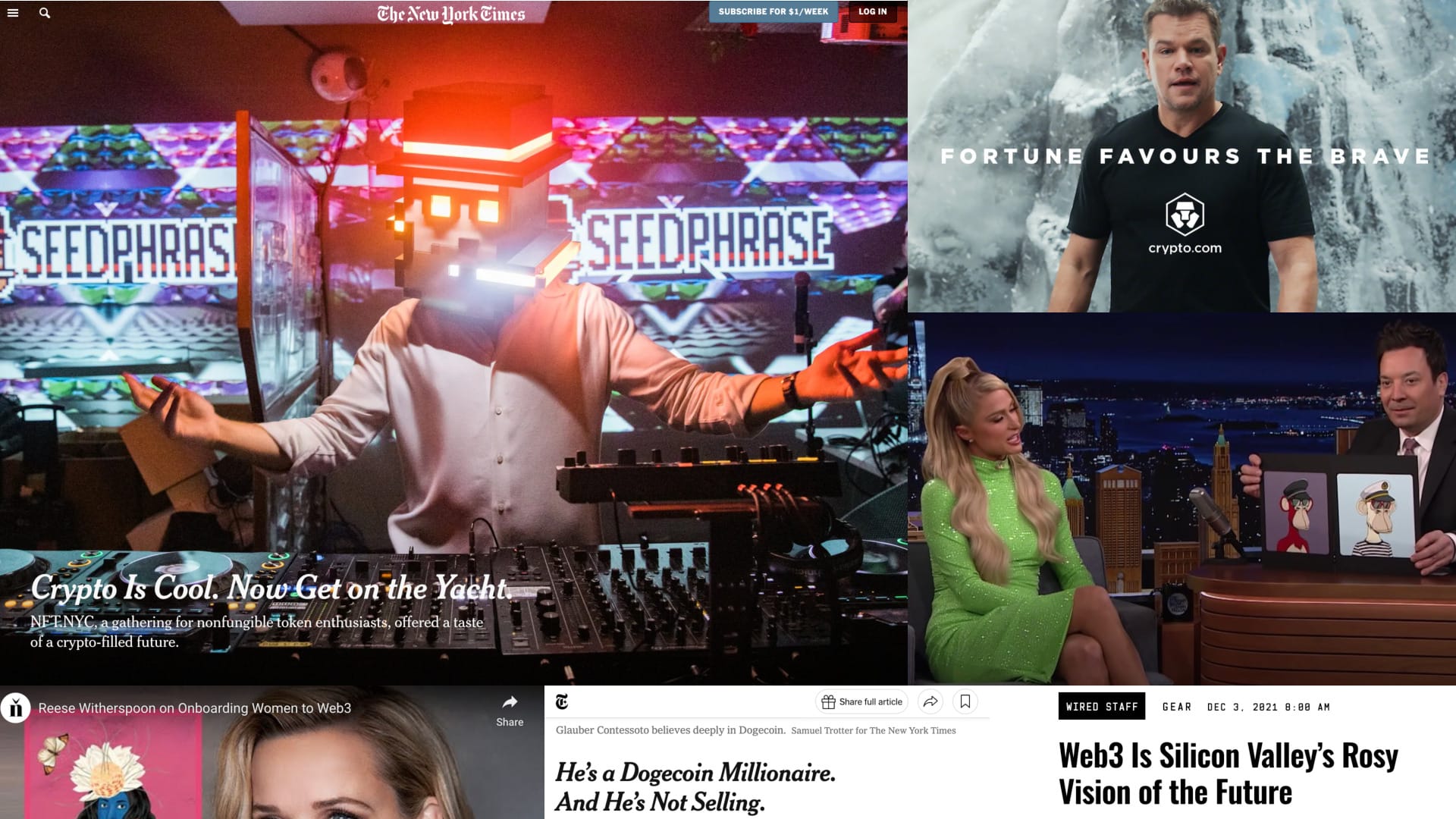
Needless to say, I had some concerns. To me, it seemed like the real story wasn’t being told. Lost among headlines describing Lamborghini-driving 20-year-olds was the reality of the industry—that a lot of people were being harmed by a sector that seemed to have 99 frauds for every one project that even tried to do something of value. But what was I supposed to do? I was a 20-something software engineer with no platform, no connections.
I ended up doing what I enjoy doing—building something cool, mostly for the sake of building it, and writing down what I saw. I coded up a quick website that would illustrate the disasters in this supposedly promising industry. Simply posting a quick blurb every time a project was hacked, or the founders ran off with all the money, or someone proposed doing something like putting all your medical data on the blockchain. They keep doing that.
I thought the timeline layout might help illustrate the frequency with which this happens, and the flaming money counter might illustrate the unbelievable scale that this was harming people. I didn’t think it would go anywhere. It would be just a fun little project to amuse me and a handful of friends who felt similarly about the "emperor with no clothes" moment that seemed to be playing out in front of us.
But this simple act of building something interesting and somewhat different had an impact that I could not have anticipated. It turned out that people were starving for it. Something that would honestly describe what was happening right in front of them without the boosterism that had infiltrated even some of the more stoic tech platforms. Something that was independent from the executives who were trying to make blockchain into the next trillion-dollar industry and from tech press that was often too willing to buy what they were selling.
And even though I was a nobody, it had a major impact.
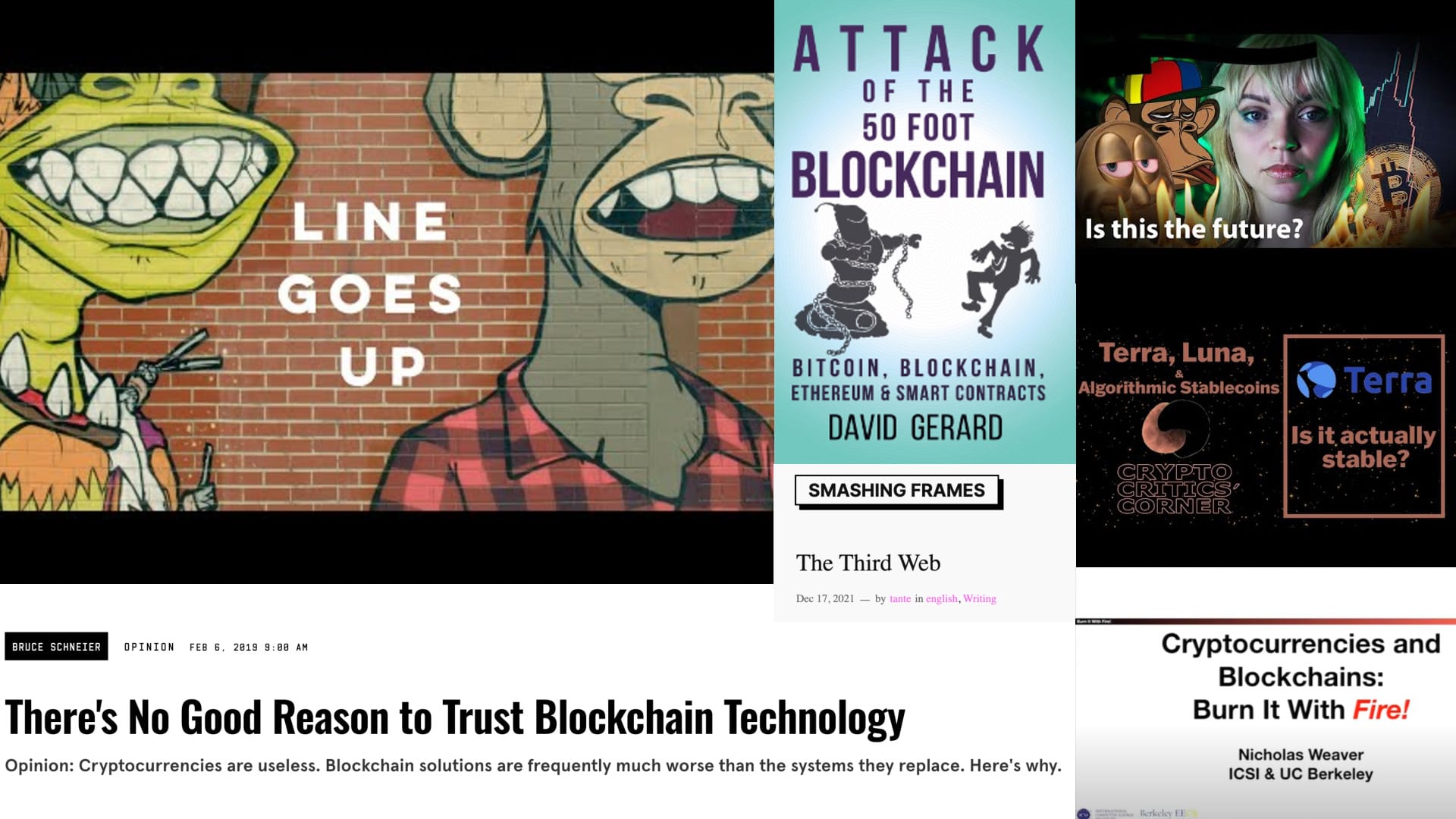
By no means did I pop the crypto bubble, which mostly had itself to thank for the massive meltdown that would happen only a year or so after I started my website. But there was a notable shift in public perception that seemed to stem largely from projects like Dan Olson’s megaviral “Line Goes Up” video, independent bloggers who doggedly spoke out against the problems in the sector, and maybe even my own work.
The lesson was clear. The tech industry, even with its billions of dollars, is not an indomitable force. Though they can and will ignore what people want from them, they cannot control what those people think. And the tide can turn against them. And it doesn’t always take a job at The New York Times or a huge pre-established platform to become one of the voices speaking up, helping to turn that tide. Sometimes you just have to make something cool. And using the very same technology that enabled crypto guys to sell their scam tokens, or the boosterist journalists to publish obsequious descriptions of companies that were really selling vaporware, or the crypto community to spam social media with promotions for their NFTs, I was able to do something a little different to push back against that very same phenomenon.
There are strong parallels, I think, between the crypto bubble a few years ago and what we’re seeing in the web much more broadly. The tech industry has, for decades, been trying to convince us that the web is just the handful of platforms run by Meta and Google and a few others. That what we do and say and read on the internet has to be intermediated by one of these platforms, or augmented by one of their LLMs, or surfaced by their algorithms.
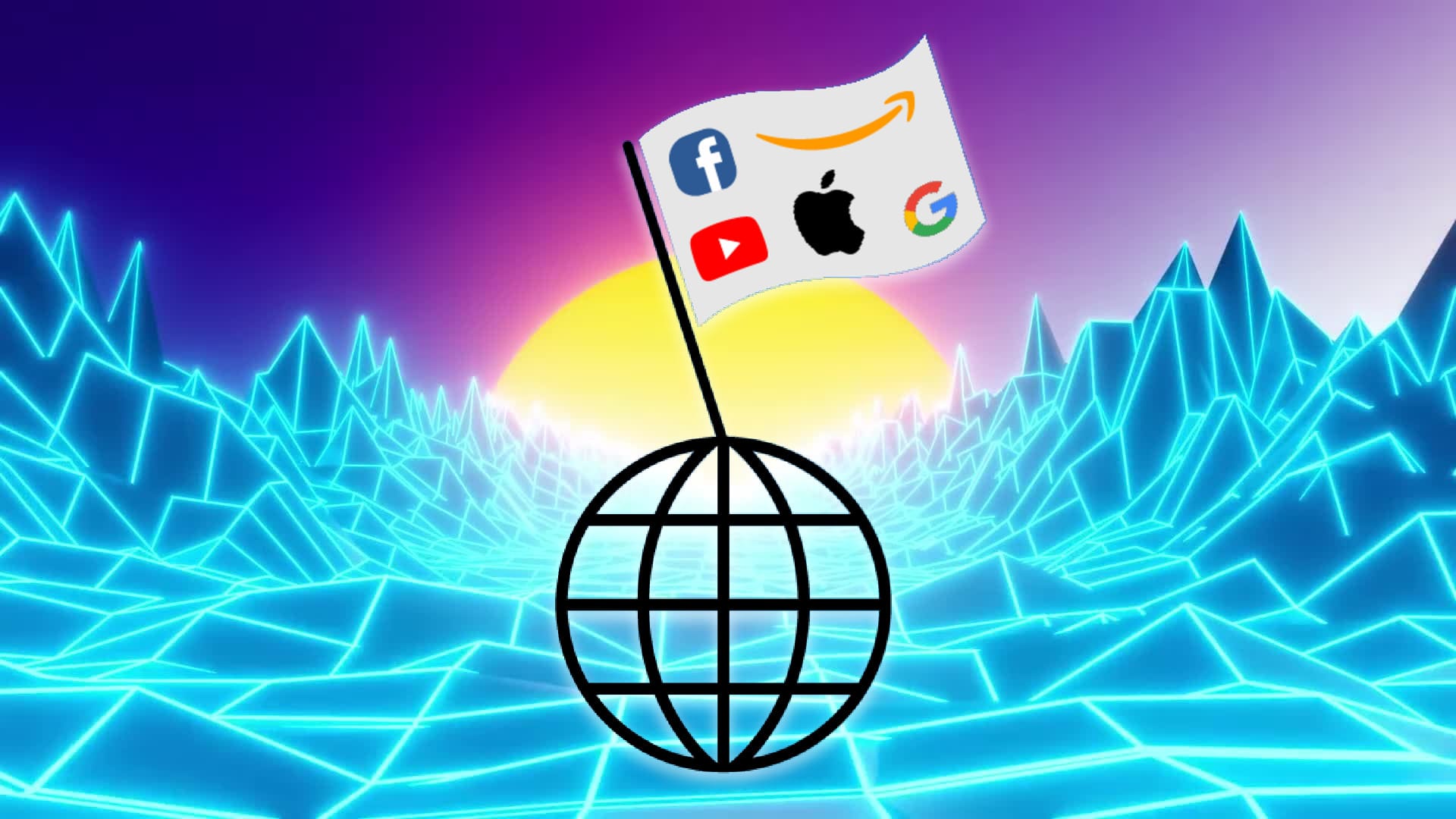
If you’ll excuse me, I shamelessly cribbed this graphic from a slide deck by Andreessen Horowitz, and I cut out the text where they complained about the “big tech oligopoly”. And so I feel the need to add...
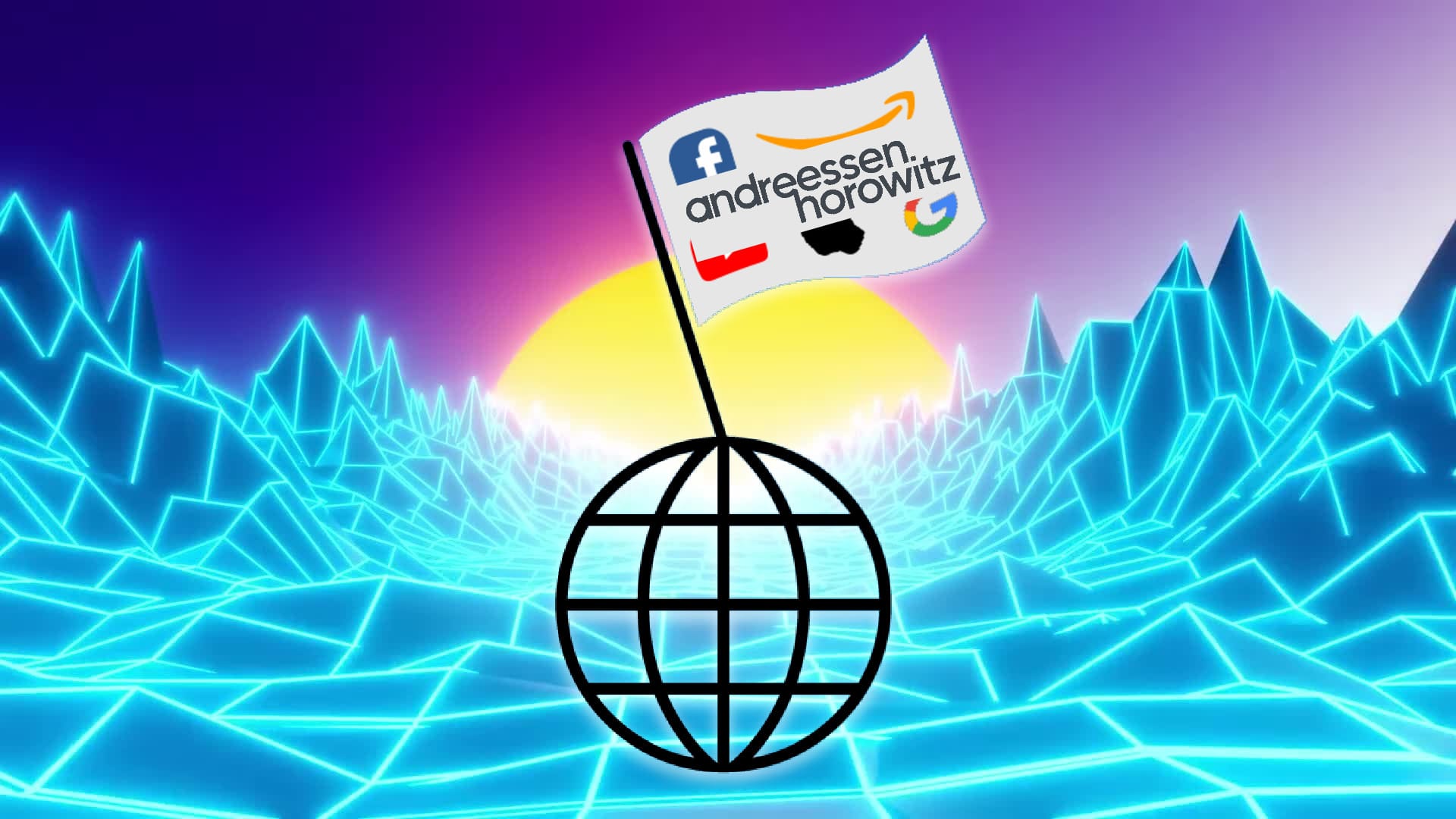
What they don’t seem to realize is that in doing so, by reducing the web only to the types of expression that can happen within their cramped boxes—where you can’t write more than 280 characters, or you can’t publish your cool JavaScript-based art project, or you can’t say the things that you want to say without getting de-boosted by the engagement maximization machine, or you can’t read what your friends are posting without the platform interjecting offensive troll posts or soulless AI-generated meme images—they’re creating a thirst for everything outside of those boxes.
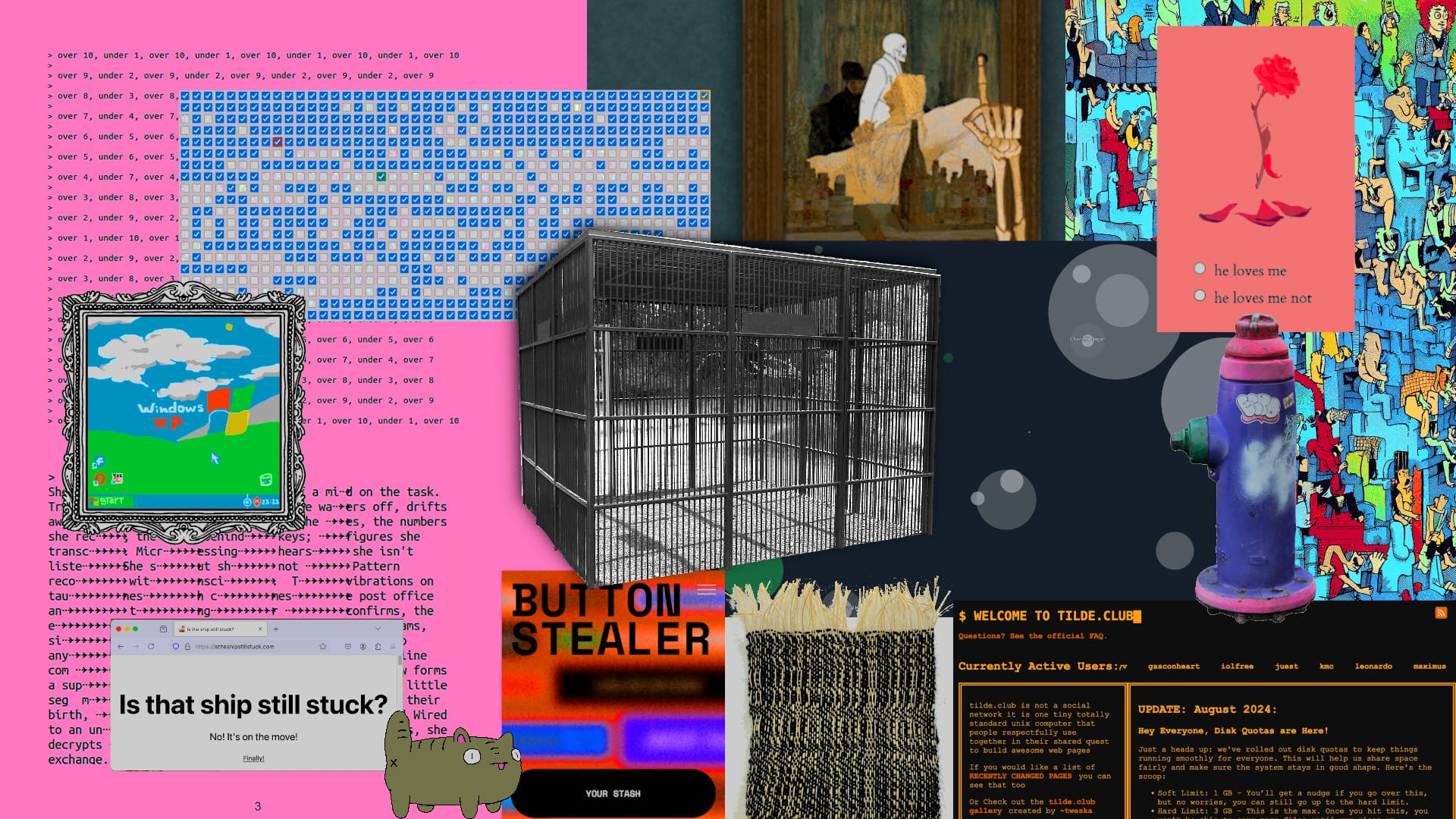
A thirst for what the web really is—a medium, a conduit, a tool that is used by readers and artists and creators and explorers, not a gatekeeper that seems to be in an ever more adversarial relationship with everyone who uses it.
I don’t mean to pretend this will be easy.
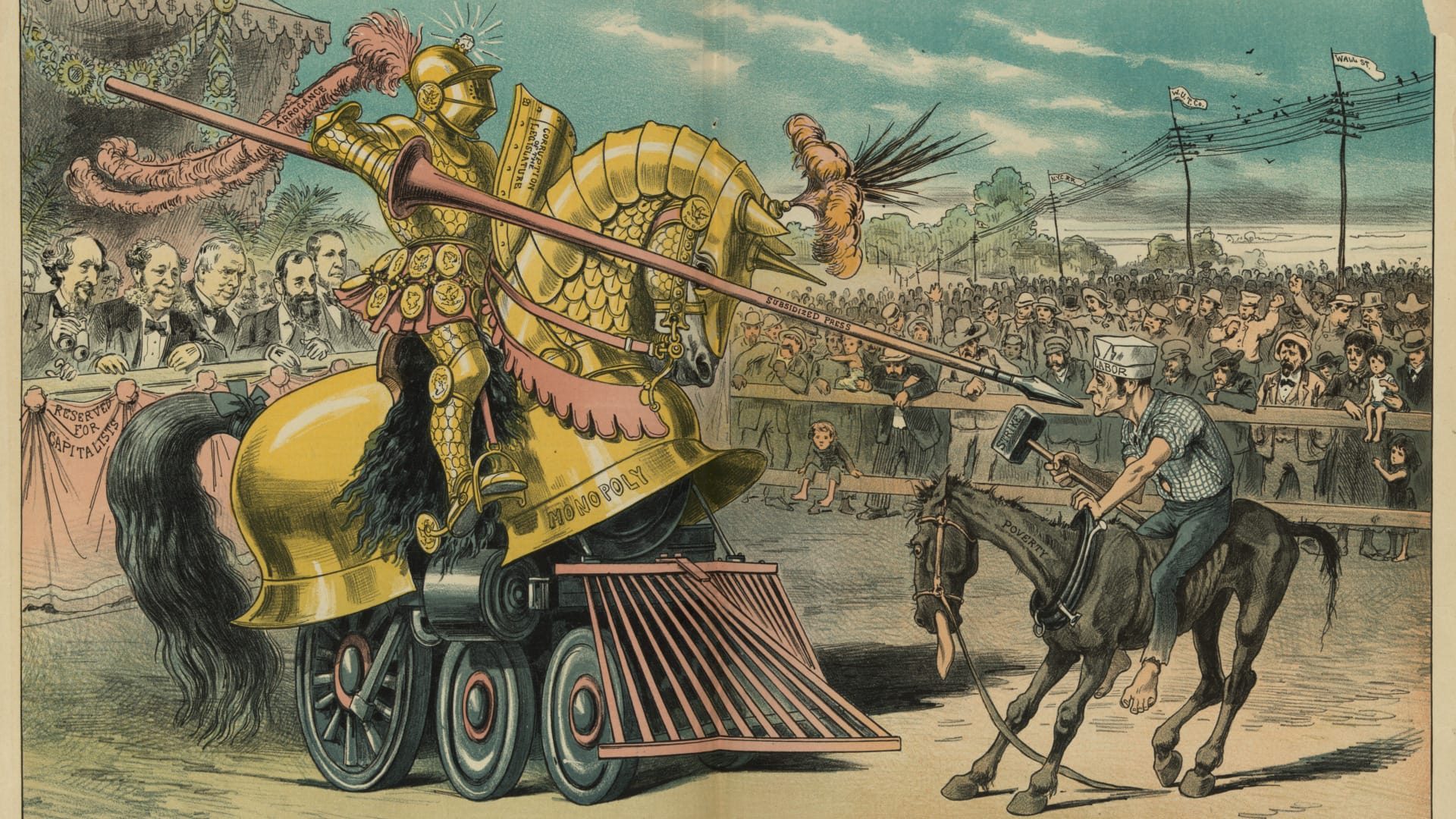
The tech oligopoly is a far bigger adversary than the cryptocurrency industry, which itself was hardly defeated and, sort of like a hydra, seems to be trying to come back.
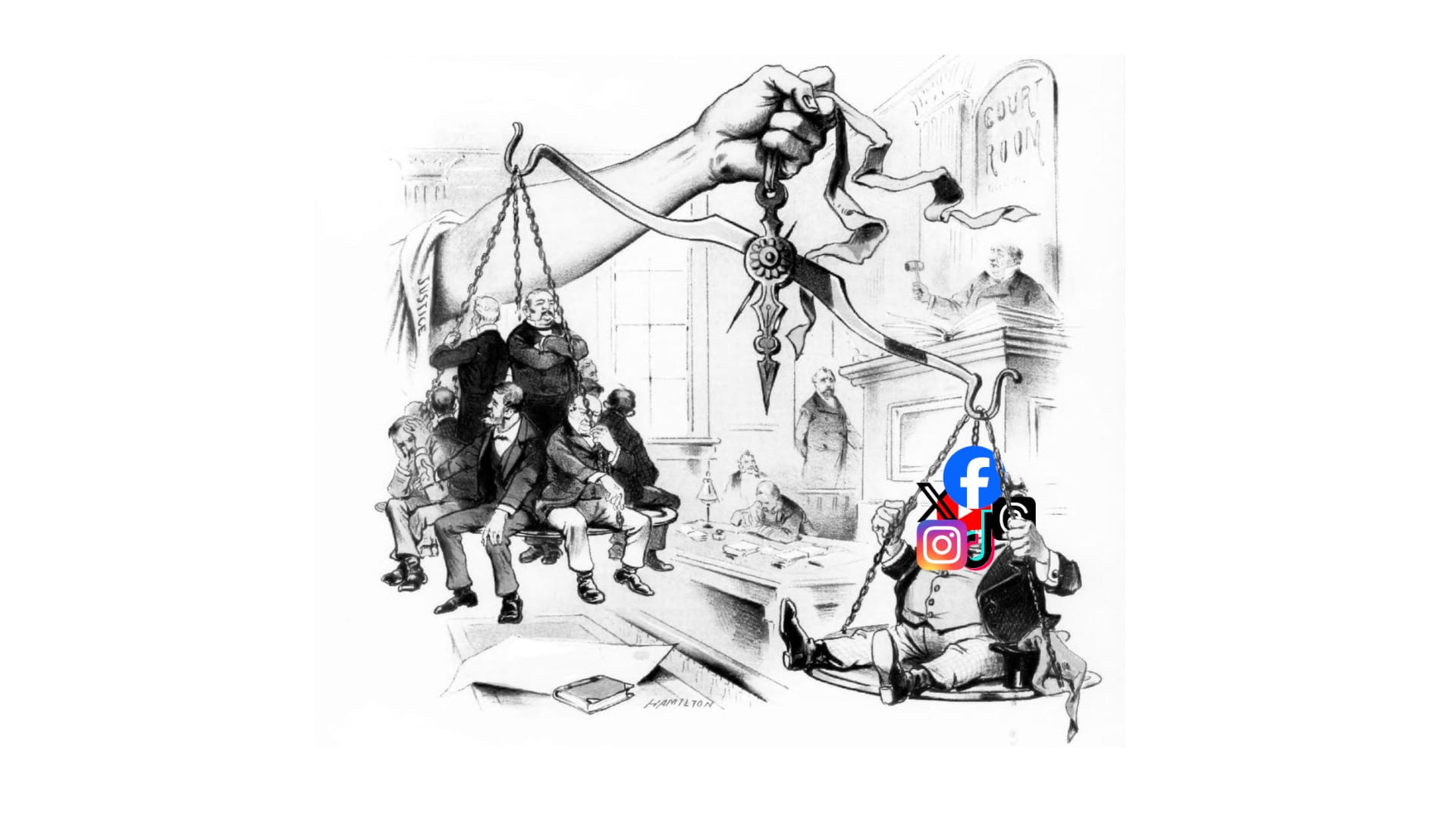
The platforms I talk about are deeply entrenched to the point where many people barely use the web outside of them. They work to crush or acquire the businesses that emerge as potential competitors, and they use their money and influence to shape laws and regulatory apparatuses to their own advantages.
But the platforms do not exist without the people, and there are a lot more of us than there are of them.

The platforms have installed themselves in a position of power, but they are also vulnerable. They must do everything perfectly to maintain that position of power—not enrage their users too much, not push the regulators too far, not miss any of those competitors who are seeking to take a portion of that power. And we have multitudes of options available to us.
For one, it has never been easier to do cool things on the web. What used to be expensive and require a great deal of technical expertise is now becoming more and more accessible, both financially and technologically, by the day. More people than ever have access to the web, both in terms of access to devices, but also in terms of access to internet connectivity and software. What used to be the realm of the nerds and those with the financial wherewithal to purchase expensive home computers, connectivity, and software packages, is now home to people from all walks of life, who bring new ideas, perspectives, and experiences that we often forget were in short supply during what some of us think of as the “good old days” of the internet.
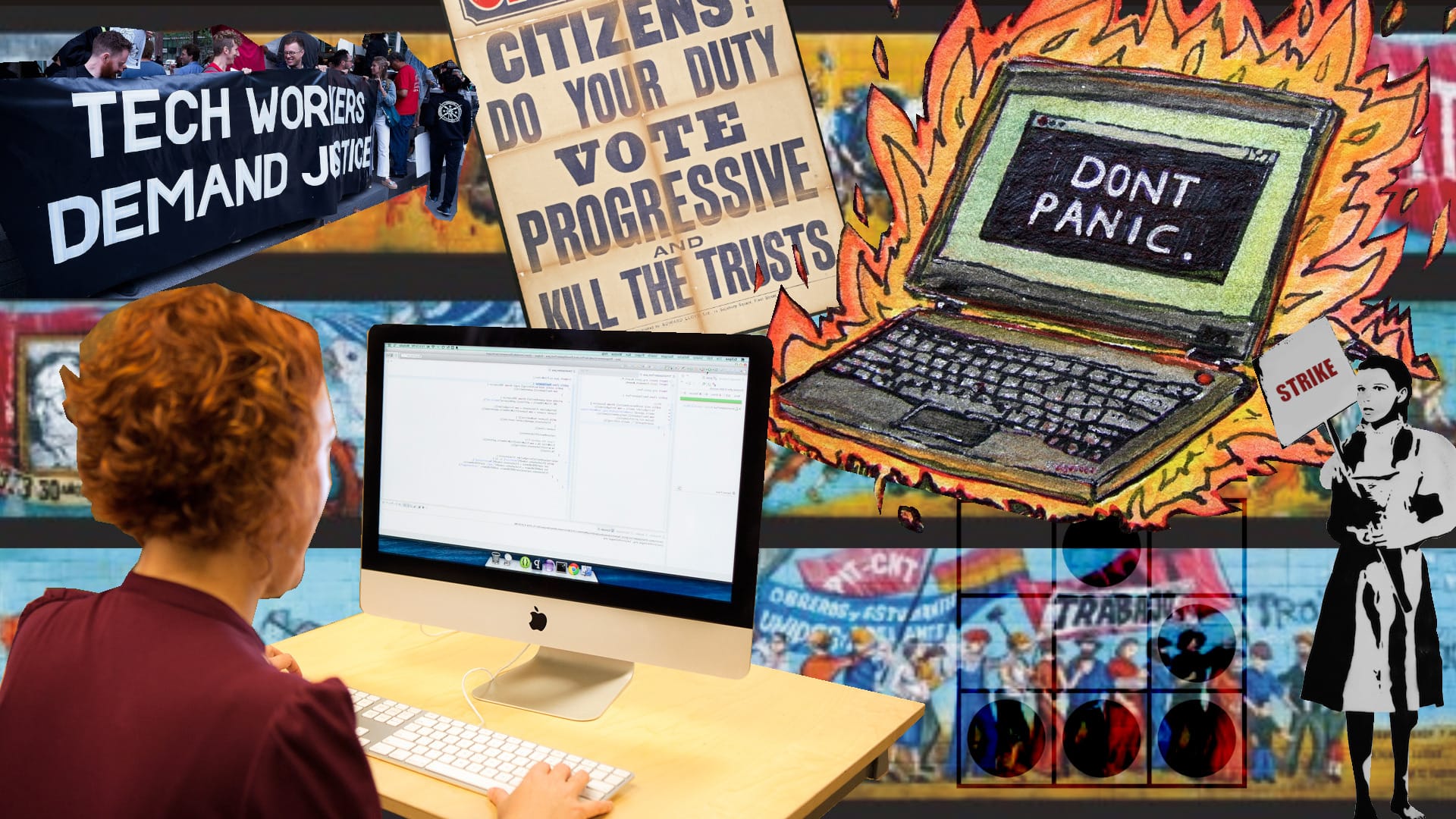
And so, we—all of us—can build the projects we want to see, write the software that the big platforms won’t, and create the services that people need. We can wire everything together, whether the platforms like it or not, to tear down the walls that they put up. We can modify the software, reverse engineer their systems, and wrestle back control of how we experience the web, even through these very platforms. We can share information and help people understand what is happening around them. We can teach others to build the things they want to build, and share with one another the important and meaningful work that is being done. We can experiment with new development models that don’t center around corporations or venture capital, and learn from some of the very successful online communities in open source or nonprofits and cooperatives, where the focus is successfully kept on what members of those communities need. We can unionize as tech workers and journalists and artists and creators and push back against the companies that are warping the things that we love, and regain some of that power to build the things that should exist—not just the things that are profitable. We can mobilize as activists, fighting for antitrust and privacy laws, and the kinds of protections for reverse engineering and adversarial interoperability that we desperately need to have control over how our own devices function. And we can support—emotionally, financially, and otherwise—all of the people who are doing these very hard and very painful and very important things.
We can build the web that we want to see, and we can return to that place where the web is a place of wonder, where all of us feel that same burning feeling of excitement as we push the web back towards the wonderful, beautiful, joyful place it ought to be.
Image attribution
- "Woodcut print by Gabriela Jolowicz, Laptop, 2010" (CC BY-SA 3.0) https://commons.wikimedia.org/wiki/File:Woodcut_print_by_Gabriela_Jolowicz,_Laptop,_2010.jpg. Modified from original.
- "Gelert" https://neopets.fandom.com/wiki/Gelert
- "Internet Archive Googly Eyes 02" (CC BY 2.0) https://commons.wikimedia.org/wiki/File:Internet_Archive_Googly_Eyes_02.jpg
- "CDC 6400 Computer System (CDC-6400-Computer-System-CC)" (CC BY 4.0) https://commons.wikimedia.org/wiki/File:CDC_6400_Computer_System_(CDC-6400-Computer-System-CC).jpg
- "No original caption. (African-American woman computer operator) - NARA - 558656" (public domain) https://commons.wikimedia.org/wiki/File:No_original_caption._(African-American_woman_computer_operator)_-_NARA_-_558656.tif
- "Fotothek df n-35 0000073 Facharbeiter für Satztechnik" (CC BY-SA 3.0) https://commons.wikimedia.org/wiki/File:Fotothek_df_n-35_0000073_Facharbeiter_f%C3%BCr_Satztechnik.jpg
- "Nyan cat", Chris Torres https://www.theverge.com/2021/2/18/22287956/nyan-cat-crypto-art-foundation-nft-sale-chris-torres
- "Winzip in 1996" https://www.webdesignmuseum.org/all-websites/winzip-1997
- Wikipedia logo https://commons.wikimedia.org/wiki/File:Wikipedia-logo-v2.svg
- "Adobe Photoshop 1.0" https://www.webdesignmuseum.org/web-design-history/adobe-photoshop-1-0-1990
- "Geocities" https://www.webdesignmuseum.org/web-design-history/geocities-1994
- "Line Mode Browser" https://www.webdesignmuseum.org/web-design-history/line-mode-browser-1991
- Firefox browser screenshot (various free licenses) https://commons.wikimedia.org/wiki/File:Firefox_8_on_Mac_OS_X.png
- "Neopets in 2001" https://www.webdesignmuseum.org/gallery/neopets-2001
- Neopets rainbow paintbrush https://neopets.fandom.com/wiki/Paint_Brush
- Neopets omelets https://www.reddit.com/r/neopets/comments/11z5pim/my_omelette_collection/
- Faerie Tonu Neopets userlookup http://neo-faeriewings.com/userlookups.php
- My Chemical Romance Neopets userlookup https://www.reddit.com/r/neopets/comments/s4dt38/i_was_transported_back_to_2011_when_i_visited/
- "Flying Coloring Wall à Marseille" (CC BY 3.0) https://commons.wikimedia.org/wiki/File:Flying_Coloring_Wall_%C3%A0_Marseille.jpg
- "Humpty Dumpty sat on a wall-- / Frank A. Nankivell 1910" (public domain) https://www.loc.gov/resource/ppmsca.27600/
- Bored Ape #4180 https://opensea.io/assets/ethereum/0xbc4ca0eda7647a8ab7c2061c2e118a18a936f13d/4180
- CryptoPunk #1040 https://opensea.io/assets/ethereum/0xb47e3cd837ddf8e4c57f05d70ab865de6e193bbb/1040
- Pudgy Penguin #7085 https://opensea.io/assets/ethereum/0xbd3531da5cf5857e7cfaa92426877b022e612cf8/7085
- Elemental #19497 https://opensea.io/assets/ethereum/0xb6a37b5d14d502c3ab0ae6f3a0e058bc9517786e/19497
- Moonbirds #5316 https://opensea.io/assets/ethereum/0x23581767a106ae21c074b2276d25e5c3e136a68b/5316
- Doodle #2078 https://opensea.io/assets/ethereum/0x8a90cab2b38dba80c64b7734e58ee1db38b8992e/2078
- "Crypto is Cool, Now Get on the Yacht", New York Times https://www.nytimes.com/2021/11/05/technology/nft-nyc-metaverse.html
- Crypto.com ad https://www.youtube.com/watch?v=dHv2FBMtlUc
- Jimmy Fallon and Paris Hilton pose with Bored Apes https://www.vice.com/en/article/jimmy-fallon-invites-paris-hilton-on-show-to-shill-ape-nfts/
- Reese Witherspoon on Onboarding Women to Web3 https://nftnow.com/podcasts/reese-witherspoon-on-onboarding-women-to-web3/
- "He's a Dogecoin Millionaire. And He's Not Selling." New York Times https://www.nytimes.com/2021/05/14/technology/hes-a-dogecoin-millionaire-and-hes-not-selling.html
- "Web3 Is Silicon Valley's Rosy Vision of the Future", Wired https://www.wired.com/story/gadget-lab-podcast-531/
- "Line Goes Up", Dan Olson https://www.youtube.com/watch?v=YQ_xWvX1n9g
- "Web3.0: A Libertarian Dystopia", münecat https://www.youtube.com/watch?v=u-sNSjS8cq0
- Attack of the 50 Foot Blockchain, David Gerard https://davidgerard.co.uk/blockchain/
- "Blockchains and Cryptocurrencies: Burn it With Fire", Nick Weaver https://www.youtube.com/watch?v=xCHab0dNnj4
- "Terra, Luna, and Algorithmic Stablecoins", Crypto Critics Corner https://www.youtube.com/watch?v=V16U4J65xkM
- "The Third Web", tante https://tante.cc/2021/12/17/the-third-web/
- "There's No Good Reason to Trust Blockchain Technology", Wired https://www.wired.com/story/theres-no-good-reason-to-trust-blockchain-technology/
- "Synthwave cyberspace sunset (low res)" (CC BY-SA 3.0) https://commons.wikimedia.org/wiki/File:Synthwave_cyberspace_sunset_(low_res).jpg
- Web with flag staked, Andreessen Horowitz, https://a16zcrypto.com/posts/article/state-of-crypto-report-a16z-2022/
- Image attribution
- "The tournament of today - a set-to between labor and monopoly" (public domain) https://www.loc.gov/resource/ppmsca.28412/
- One Million Checkboxes https://onemillioncheckboxes.com/
- Hydrant 40.700192 N, 73.912821 W https://www.dayroselane.com/hydrants/details/40_700192_-73_912821
- "Visitors safety cage (30682381462).jpg" (CC BY-SA 2.0) https://commons.wikimedia.org/wiki/File:Visitors_safety_cage_(30682381462).jpg
- over/under by Alice Strete https://esoteric.codes/blog/codeart-journal
- Mondays.cloud https://www.mondays.cloud/imgs/2k/png8-16-noise-p/1978-07-05-2.jpg-25e-1650368765-seed1005-p0.999-k2048-1024x2048-25e-1650370468-splinter-0-gigapixel-lines-scale-2_00x.png
- Windows XP drawing in Different Strokes https://differentstrokes.xyz/user/_seroton1n_
- Stray cat https://alienmelon.itch.io/stray-cat
- Is the ship still stuck? https://istheshipstillstuck.com/
- tilde.club https://tilde.club/
- "Love me or not" https://www.aliciaguo.com/love-me-or-not/
- "From mechanical times to organic times" https://thehtml.review/03/weaving-web/
- Button stealer https://anatolyzenkov.com/stolen-buttons/button-stealer
- Listen to Wikipedia http://listen.hatnote.com/
- Judge Magazine cover (13 February 1886) https://commons.wikimedia.org/wiki/File:JudgeMagazine13Feb1886.jpg
- "Lenovo G500s laptop-2905" (CC BY-SA 4.0) https://commons.wikimedia.org/wiki/File:Lenovo_G500s_laptop-2905.jpg
- "Laptop and books (Unsplash)" (CC0) https://commons.wikimedia.org/wiki/File:Laptop_and_books_(Unsplash).jpg
- "Pixel 7a (2023)" (CC BY-SA 4.0) https://commons.wikimedia.org/wiki/File:Pixel_7a_(2023).svg
- "Moto G4 Plus" (CC BY 3.0) https://commons.wikimedia.org/wiki/File:Moto_G4_Plus.png
- "Close Up of Apple Watch 8" (CC BY 4.0) https://commons.wikimedia.org/wiki/File:Close_Up_of_Apple_Watch_8.jpg
- "WMUK Samsung Chromebook" (CC BY-SA 3.0) https://commons.wikimedia.org/wiki/File:WMUK_Samsung_Chromebook.JPG
- "Systemax Venture" (CC BY-SA 3.0) https://commons.wikimedia.org/wiki/File:Systemax_Venture.JPG
- "IPadmini-vs-iPad3" (GNU FDL) https://commons.wikimedia.org/wiki/File:IPadmini-vs-iPad3.png
- "Computer monitor remix transparent" (public domain) https://commons.wikimedia.org/wiki/File:Computer_monitor_remix_transparent.png
- "Bono-Act-consequence" (CC BY-SA 3.0) https://commons.wikimedia.org/wiki/File:Bono-Act-consequence.jpg
- "Citizens! Do Your Duty. Vote Progressive and Kill the Trusts. (22713412780)" (public domain) https://commons.wikimedia.org/wiki/File:Citizens!_Do_Your_Duty._Vote_Progressive_and_Kill_the_Trusts._(22713412780).jpg
- Hacker glider (public domain) https://commons.wikimedia.org/wiki/File:Glider.svg
- "Programmer writing code with Unit Tests" (CC BY-SA 4.0) https://commons.wikimedia.org/wiki/File:Programmer_writing_code_with_Unit_Tests.jpg
- "Don't panic" (CC BY-SA 2.0) https://www.flickr.com/photos/sarabbit/4549185468/
- "Protect Net Neutrality rally, San Francisco (37730250012)" (CC BY 2.0) https://commons.wikimedia.org/wiki/File:Protect_Net_Neutrality_rally,_San_Francisco_%2837730250012%29.jpg
I have disclosures for my work and writing pertaining to cryptocurrencies.

